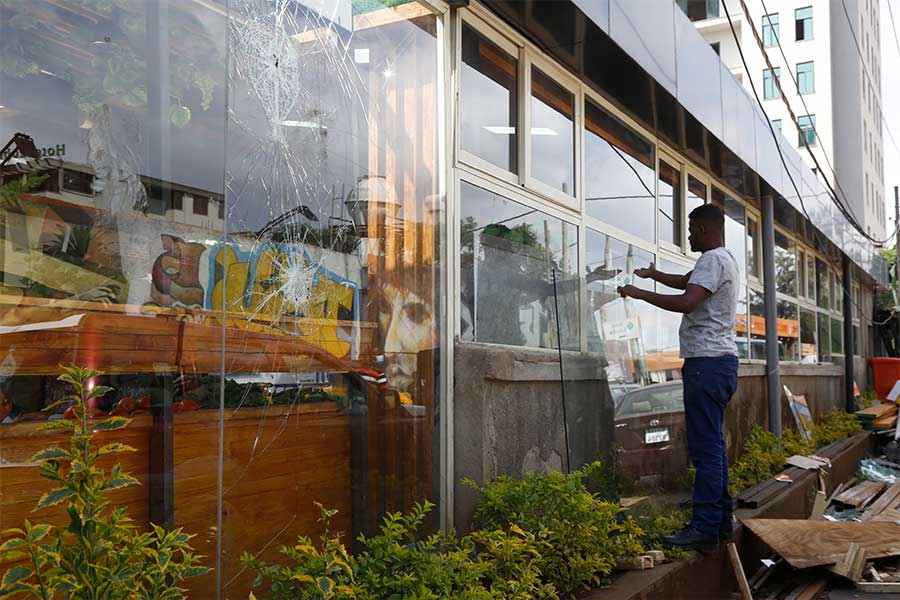
Fortune News | Mar 30,2024
Feb 15 , 2020
By Christian Tesfaye
A feeling of doom and gloom casts a long shadow over Ethiopia. People are terrified. They are unnerved by what they see in the country. The threat of violence, disorder and chaos have us appreciating the relative stability we used to experience just a few years back.
Yet, we also find people who are incredibly cheery. Sure, they decry the rising cost of living, the political partisanship and the bad news that comes out almost every other week or month. But they do not seem to be as fazed by it. They claim they see the light at the end of the tunnel, the glass half full, the silver lining hidden in the clouds.
Because they are positive. They would rather focus on the positive than on the negative. This helps radiate positive energy, they claim, which could aid us greatly in our endeavours. If only every Ethiopian was endowed with a positive mindset, it would be possible to move forward as a nation, according to these people.
They also provide us with anecdotes. They know people who have tried it, they have tried it as well and it works. They were able to turn their lives around by merely developing a positive attitude. For them, correlation is causation. There was a time when they believe they started to become more optimistic and, in that period, their professional and social lives began to improve. Success, to them, must have been caused by their decision to look at the world through rainbow-coloured lenses.
If we showed these people the diagram of ice cream sales increasing in the summer season when there is also a rise in shark attacks, they would swear that ice cream draws sharks to humans.
It is rare to find people down the socioeconomic ladder who see life in the same way. These are people who are accused of being too pessimistic and negative about life.
How can the kids on the streets see life positively? Would we believe our own words when we tell them that if they dusted themselves up every time life threw them a curveball and worked hard, they could pick themselves up?
It is for this reason that the theory of meritocracy falls flat on its face. In a world where the few have had too much of a head start in the form of the wealth and institutional advantages they have inherited, people cannot be asked to compete on the same playing field.
It should not come as a surprise that it is these same people, who have had a running start, that want us to be positive. From their perspective, one has a choice whether or not to see the glass half full. They do not realise that from the perspective of the rest of us, the glass is actually all empty.
“I believe we ought to do all we can and seek to lift ourselves by our own bootstraps,” said Martin Luther King, the great civil rights activist said, “but it’s a cruel jest to say to a bootless man that he ought to lift himself by his own bootstraps.”
It is a powerful indictment against the argument that all a person needs to succeed is ambition, courage, commitment, integrity and optimism. Such a view is an insult to all those who were robbed of the education, networking and minimum starting capital for self-investment, and as a result failed to catch up.
Our personal, social and economic achievements are the sources of our success. To assume that it is the other way around is to endorse the regressive view that assigns blame to victims of history and institutions.
PUBLISHED ON
Feb 15,2020 [ VOL
20 , NO
1033]


Fortune News | Mar 30,2024

Radar | Jun 01,2024

Radar | Jan 12,2019

View From Arada | Oct 07,2023

Films Review | Jan 26,2019

Commentaries | Aug 27,2022

Commentaries | Nov 30,2024

Fortune News | May 24,2025

Sunday with Eden | Dec 31,2022

Featured | Jul 13,2020

My Opinion | 131974 Views | Aug 14,2021

My Opinion | 128363 Views | Aug 21,2021

My Opinion | 126301 Views | Sep 10,2021

My Opinion | 123917 Views | Aug 07,2021

Dec 22 , 2024 . By TIZITA SHEWAFERAW
Charged with transforming colossal state-owned enterprises into modern and competitiv...

Aug 18 , 2024 . By AKSAH ITALO
Although predictable Yonas Zerihun's job in the ride-hailing service is not immune to...

Jul 28 , 2024 . By TIZITA SHEWAFERAW
Unhabitual, perhaps too many, Samuel Gebreyohannes, 38, used to occasionally enjoy a couple of beers at breakfast. However, he recently swit...

Jul 13 , 2024 . By AKSAH ITALO
Investors who rely on tractors, trucks, and field vehicles for commuting, transporting commodities, and f...

Jul 5 , 2025
Six years ago, Ethiopia was the darling of international liberal commentators. A year...

Jun 28 , 2025
Meseret Damtie, the assertive auditor general, has never been shy about naming names...

Jun 21 , 2025
A well-worn adage says, “Budget is not destiny, but it is direction.” Examining t...

Jun 14 , 2025
Yet again, the Horn of Africa is bracing for trouble. A region already frayed by wars...

Jul 6 , 2025 . By BEZAWIT HULUAGER
The federal legislature gave Prime Minister Abiy Ahmed (PhD) what he wanted: a 1.9 tr...

Jul 6 , 2025 . By YITBAREK GETACHEW
In a city rising skyward at breakneck speed, a reckoning has arrived. Authorities in...

Jul 6 , 2025 . By NAHOM AYELE
A landmark directive from the Ministry of Finance signals a paradigm shift in the cou...

Jul 6 , 2025 . By NAHOM AYELE
Awash Bank has announced plans to establish a dedicated investment banking subsidiary...